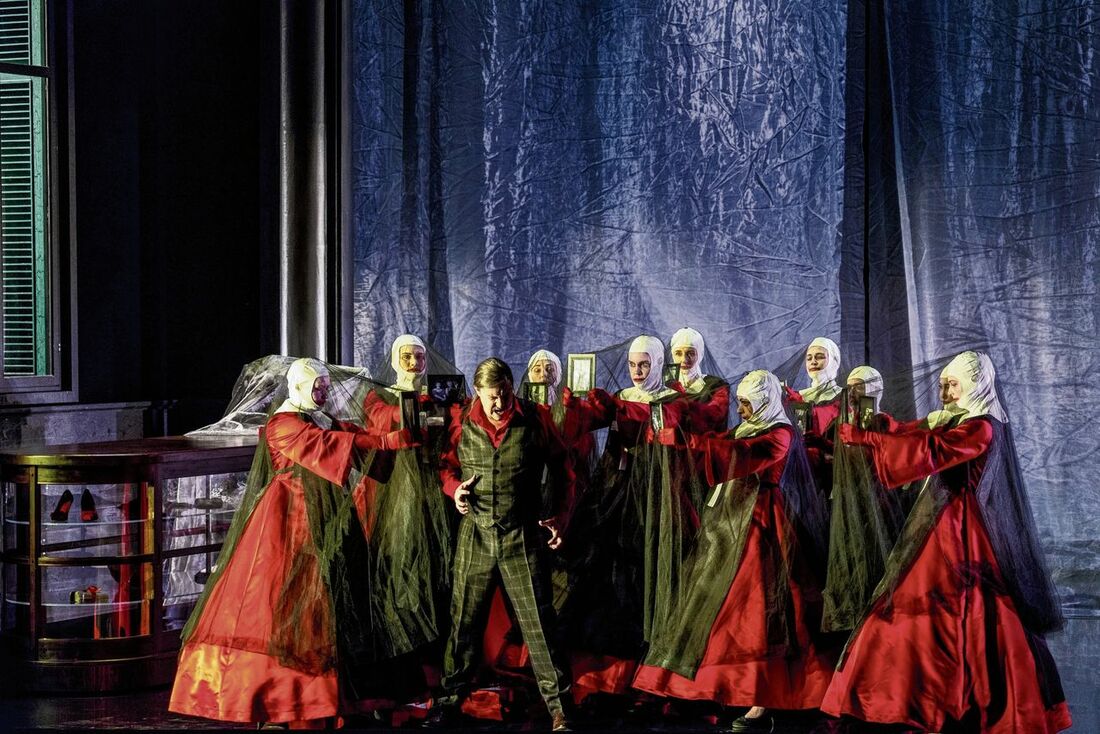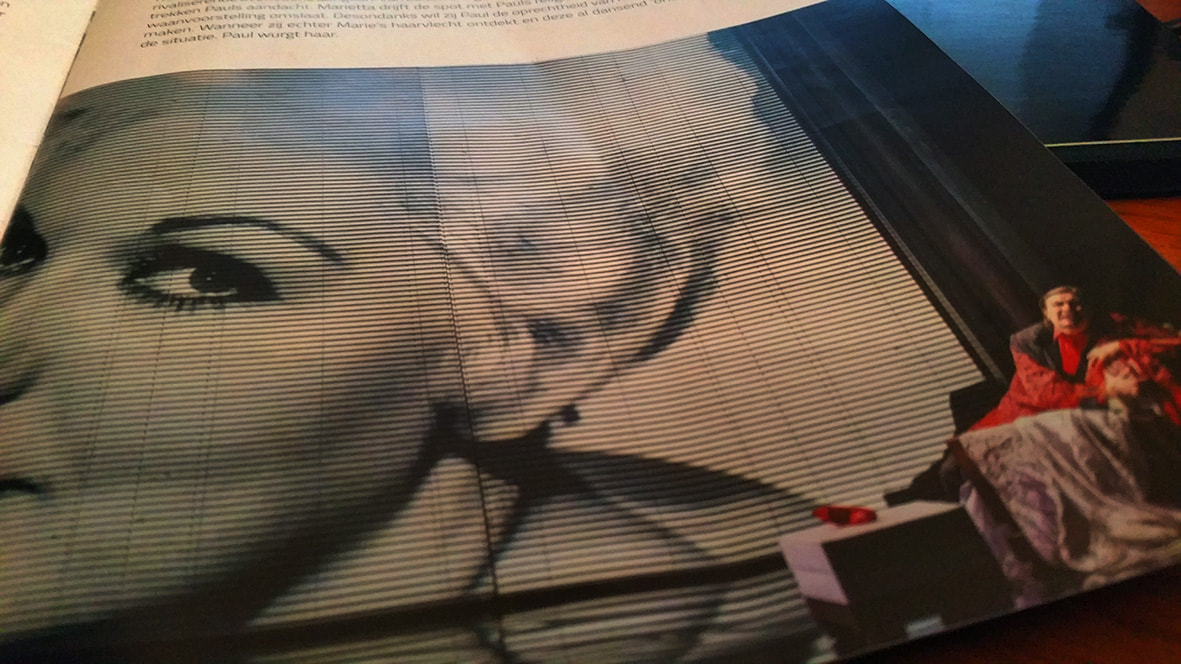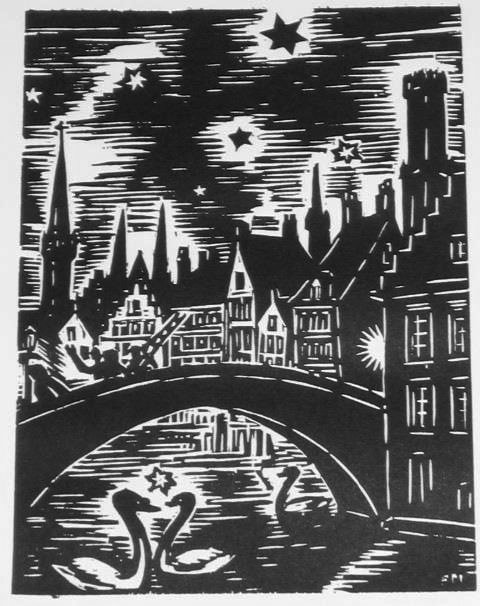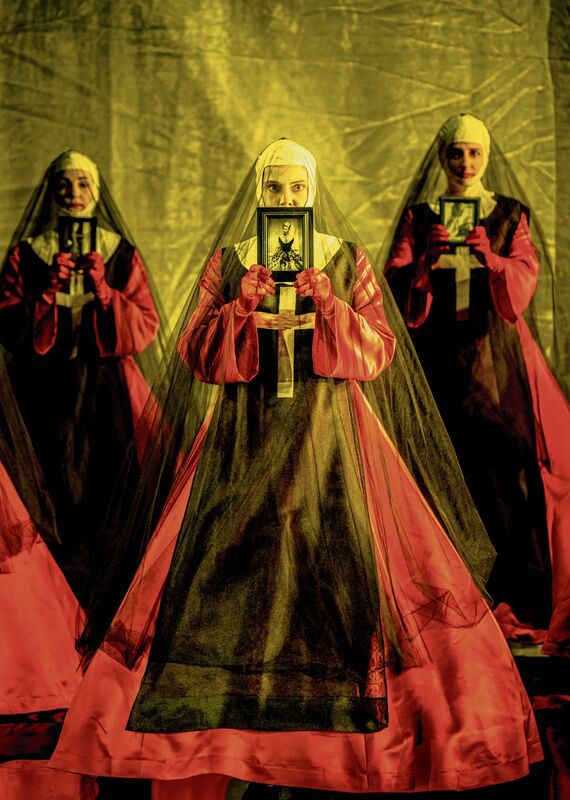De Nederlandse Reisopera brings Korngold's Die Tote Stadt to life De Nederlandse Reisopera, the opera nomads who keep surprising us with interesting and inventive productions, brings in the darkest months of the year Die Tote Stadt to life on the various stages in Holland. After an extraordinary Fliegende Holländer last year (read the review here), they take with Die Tote Stadt again a German opera to the stage in which the concentric circles that revolves around love (preferably unconditionally) and death (always irrevocably) come together in a production in which great gestures are always in connection with the most subtle of feelings and the theatrical potential that lies in this late-romantic piece is articulated with skill. It results in an evening filled with lyrical drama, to experience, as often in good art, on multiple levels. Die Tote Stadt is the third opera by Erich Wolfgang Korngold who had, at the time of composing, with Der Ring des Polykrates and Violanta, already two successful operas (as a 23-year-old!) to his name. The success of these operas made Die Tote Stadt, even before the premiere, to a sought-after piece, of which several theatres in Germany competed with each other to be allowed to give the world premiere. This eventually led to the rather unique situation that in 1920 the world premiere took place simultaneously in Köln and Hamburg (Otto Klemperer conducted in Köln, his wife sang the role of Marietta there). Despite the success of his operas and the fact that at the age of 11 the composer had been labeled by Gustav Mahler as a musical genius (he better didn't go to the conservatory, there was nothing he could learn there any more), Korngold's career was ultimately one in which the expectations raised at a young age were not completely fulfilled. This was, in part, due to the rise of the Nazis in the 1930s. Because of them the composer fled to America (to find a job in Hollywood). There the film soundtracks earned him two Oscars (for Anthony Adverse and The Adventures of Robin Hood) but the step from a composer of operas to a composer of moviescores would seriously damage Korngold's image as a serious composer. In 1920 the world premiere of 'Die Tote Stadt' took place simultaneously in Köln and Hamburg. Otto Klemperer conducted in Köln, where his wife sang the role of Marietta. Die Tote Stadt is an opera about a man in Bruges who scourges himself and his immediate surroundings with the memory of his deceased beloved Marie. It is the story of Paul who has locked himself up in a room that he has decorated as a temple for the woman whose death he cannot accept. Death shows itself inexorably in his mind and any attempt by his friends to free that mind, to penetrate it, seems doomed to failure. The struggle with what has been frozen in time seems to be a futile one, everything that can lead to a possible new life is tainted by the inviolability of death. Marietta, in whom Paul recognizes his deceased beloved, finds him a strange guy but feels attracted to him nonetheless. It will be her will to life that ultimately causes her to attempt to persuade Paul to exchange the memory of his deceased Marie for a new life with her, a new love. Music and libretto follow Paul's journey from the dark grey world of the first act to a world full of colour, the world of Marietta, in the following acts. Marietta is mirrored, projected on a large screen, to a few female protagonists from Hitchcock films. Kim Novak, Grace Kelly and Janet Leigh. Portraits of actresses who are like visual leitmotifs. They indicate what Marietta is; the woman as a substitute (Kim Novak in Vertigo), and they predict her fate (Janet Leigh in Psycho). Marietta and Marie's appearance are played by Iordanka Denlova. A Bulgarian soprano who combines the requested zest for life and feeling for the theatrical in a role as powerful as it is sensual. Acting and singing melt together in a woman who, contrary to the libretto, is not to survive the opera. But more about that later. Turning to the world of opera in 2009, former rock singer, Swedish tenor Daniel Frank by now has added the Wagner roles Tannhäuser and Siegfried to his repertoire. Roles that have to carry an opera, and that experience is expressed in an interpretation of Paul that is firm yet by times a bit erratic. For the sensual, that titillating of Korngold's melody lines that have to lift the piece, we have to wait for his duet with Marietta, the famous "Glück, das mir verblieb". But from that moment on it's a hit. From that moment on music, lyrics and staging pick you up to deliver you almost 3 hours later, the mind satisfied and the spirit ripened, at the exit of Theater Carré where a glance at the city that is anything but dead, Amsterdam, has proved itself to be a perfect host for the dead city; 19th century Bruges. A city that is by then engraved in the mind like a woodcut of Frans Masereel.
For the plot this production goes back to George Rodenbach's novella "Bruges la Morte" on which the libretto is based. Korngold's father, Julius, music critic of Die Neue Freie Presse, where he succeeded Eduard Hanslick, proposed to stage Paul's murder of Marietta in Paul's mind. Here the opera adds a ray of light to the dark ending in the novella; Paul is given a second chance. With Korngold the drama lies in the fact that Paul has to face that a resurrection, an Auferstehung, of a loved one is impossible (we'll have to turn to Mahler's Second Symphony for that). A murder, an act of violence, in a dream as trigger for catharsis. Director Jakob Peters-Messer does not find this credible and sees his finding supported by Sigmund Freud's dream theory, well known at the beginning of the twentieth century. Peters-Messer draws the murder away from the libretto, away from the dream, and places it back into reality. This is scouring with the text and libretto that, from the dark beginning, express an increasing alienation from reality. In art, and in opera perhaps even more so than in literature, theatre and film, aesthetics largely determine the content. Many an implausible opera plot is saved by music. This is also the case with Korngold and the musicians who serve him here. Sensual colorite rises from the orchestra pit where conductor Antony Hermus and the Noord Nederlands Orkest bring to life what Korngold entrusted to paper almost a century ago. What seems far-fetched from a narrative point of view is made acceptable by the music, making the turn the libretto makes to the novella a unnecessary one. Paul's friends, Frank and housekeeper Brigitta, see Marietta's corpse lying on the floor and when Frank asks Paul if he might not go to another place now that his memories of Marie apparently no longer hold him to his room in Bruges, we see police and medical staff. That other place, in the libretto another city, can be interpreted here as a cell in the prison or institution. When the curtain falls for the rest of the cast, Paul is the last man standing, singing a reprise of "Glück, das mir verblieb" - the aria he sang in duet with Marietta in the first act. It is a farewell to Bruges and a farewell, in this production, to his freedom. He exchanges the prison in his head for a real one. The dream of reality has put an end to the dream of love. Thus, De Nederlandse Reisopera brings Die Tote Stadt to life almost one hundred years after its premiere. An opera by a composer who has been somewhat neglected by music history. The thoughts of Korngold and the composers who suffered a similar fate, popular during the interbellum and for a big part forgotten after the Second World War, make this production an extra sympathetic one and a justifiable attempt to evade from obscurity where history so mercilessly has condemned it to. It would therefore be nice, with the success of this production fresh in mind, if someone contemplating possible productions for upcoming seasons thinks of the name of Franz Schreker. Theater Carré Amsterdam - 30 January 2019 Conductor: Antony Hermus Noord Nederlands Orkest Choir conductor: Andrew Wise Consensus Vocalis Regie: Jakob Peters-Messer Stage design: Guido Petzold Costume design: Sven Bindsell Paul: Daniel Frank Marietta/Marie: Iordanka Derilova Frank: Marian Pop Brigitta: Rita Kapfhammer - Wouter de Moor
0 Comments
Leave a Reply. |
TIMELINE
July 2024
|





 RSS Feed
RSS Feed